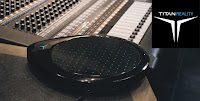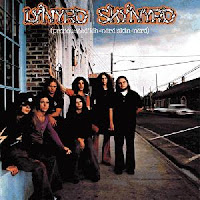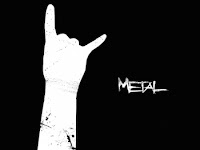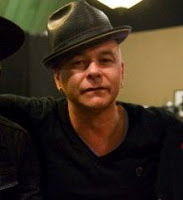A while back I wrote a post about the isolated guitar tracks from Lynyrd Skynyrd classic "Free Bird," but now it's time to give a listen to the isolated bass and drums, which are equally interesting.
At 9:22, this is a long one, but sit back and have a listen to some things I bet you never heard on the song before. Just for the record, guitarist Ed King plays bass (the original bass player Leon Wilkerson have temporarily left the band) and Bob Burns is on drums.
1. The intro is kind of shaky time-wise, but falls into the pocket as soon the groove begins.
2. Listen to the the nice sounding short reverb on the snare. There's a lot of it here but you hardly hear it in the mix.
3. The bass is played with a pick but has a nice round sound. Sometimes you'll hear play two notes at a time, almost like a chord, especially at the stops around 6:30.
4. When the song kicks into the outro solo at 4:36, listen to how instrumental the bass is developing the song and increasing the excitement. A little on top of the beat sometimes but it works in the track.
5. Be sure to listen all the way to the end to hear the ending that never appears on the final mix on the record.
Help Support This Blog
Friday, October 30, 2015
Lynyrd Skynyrd "Free Bird" Isolated Bass And Drums
Labels:
Free Bird,
isolated bass and drums,
Lynyrd Skynyrd,
video
Thursday, October 29, 2015
What Metal Songs Sound Like Without Distortion
Almost from the beginning of time in recorded music, guitarists have loved sustain and distortion.
It's so much fun to play with distortion that some players never stop playing that way, but it can also lead to some bad habits that don't happen when playing clean.
That said, here's an interesting video from the Dutch metalhead Vaalvla playing a medley of songs by Metallica, Slayer, Slipknot and Pantera without the distortion.
Needless to say, the songs take on an entirely different vibe.
It's so much fun to play with distortion that some players never stop playing that way, but it can also lead to some bad habits that don't happen when playing clean.
That said, here's an interesting video from the Dutch metalhead Vaalvla playing a medley of songs by Metallica, Slayer, Slipknot and Pantera without the distortion.
Needless to say, the songs take on an entirely different vibe.
Labels:
electric guitar,
guitar distortion,
METal,
video
Wednesday, October 28, 2015
7 Tips To Get Your Voice Ready For The Gig
Eventually every singer has some vocal trouble, and if you’re not careful, it can really lead to long term damage. That’s why it’s important for a singer to learn to be especially aware of the need to take care of him or herself.
Here's an excerpt from the band improvement book How To Make Your Band Sound Great with 7 tips to help vocalists keep their voices healthy and ready to sing at every gig and recording session.
"1 - Aside from being sick, the number one cause of vocal problems is not getting enough sleep. When you’re tired, all the parts of your body needed to support your vocal cords tend to weaken a bit, which leads improper breathing and thus throat problems shortly after you begin to sing. Get as much sleep as you can (preferably seven or eight hours) the night before a gig, or at least take a nap on the day of the gig so you can feel somewhat refreshed.
2 - The next thing is to avoid milk (and any dairy products for that matter) from three to six hours before you sing. Anything with milk in it will cause an excess production of phlegm around your vocal chords, so that’s a definite no-no. The old remedy of milk and honey for a rough throat is very soothing after the gig, but not before!
3 - If you are hungry before a gig, don’t be afraid to eat, but just eat until you’re satisfied and don't stuff yourself with a seven course meal. Try not to eat in the last hour before your performance in order to avoid that excess phlegm again. If you do feel phlegmy, you’ll have the strongest temptation to clear your throat (which can be harmful) immediately after eating, but waiting an hour is usually enough time for your meal to settle.
4 - And speaking of clearing your throat, there are some that say that you should never try to clear your throat because it can cause some damage, but it’s usually necessary because excess mucous inhibits really inhibits your singing. The trick is to find a way to clear your throat without irritating it and the best way is to do a gentle "whispered cough" and then swallow and repeat. If this doesn't work, you need to deal with the excess mucous production. Squeeze a 1/4 of a lemon into a tall glass of water and sip over a period of about twenty minutes. This should cut through a lot of the excess mucous.
5 - Other things to avoid are alcohol, tea (despite popular belief), coffee, cola and anything else with caffeine, since these actually have a dehydrating effect, which is quite the opposite of what you really need.
6 - One thing you should do is drink lots and lots of water (ideally two to three quarts a day - the more the better) because a dry throat leads to a sore throat. If you live in an arid climate like Arizona, sleep with a humidifier next to your bed and try to warm up your voice in the shower. The moisture can be an incredible help for your voice. Also, learn to breathe in through your nose as much as possible. This will help moisten the air before it reaches your vocal cords.
7 - Finally, some singers swear by Entertainer’s Secret, a spray mixture that lubricates the vocal cords and was developed by an ear, nose and throat specialist. Others really like Superior Vocal Health's Throat Saver, a completely organic vocal lubrication, also developed by a singer."
Tuesday, October 27, 2015
Abbey Road Launches Music Tech Incubator
 |
| Abbey Road Red's first investment |
Backed buy Universal Music Group (which now owns the studio), Red is offering expertise, mentorship, advice and a testing ground for products in exchange for a 1 to 2% equity stake. The incubator has an ambitious agenda of hosting 3 startups every 6 months.
The first project for red is Titan Reality's Pulse, which was on display at the Red launch in the facility's famous Studio 2 last week.
Pulse is a sensor pad and controller that recognizes objects on its surface and in the air, enabling you to play a virtual instrument without having to physically touch a control surface. The device will be released by the end of the year with a retail price of around $1,200 US.
This is a great thing for the music tech industry in that traditional money sources have difficulty grasping the music market and the significance of a product, therefore making the money raising process somewhat harder than other tech segments. Find out more about Abbey Road Red here.
Labels:
Abbey Road Red,
Abbey Road studios,
incubator,
Titan Reality Pulse,
Universal Music Group,
venture capital
Monday, October 26, 2015
New Music Gear Monday: Aurora Audio Stinger Mic Preamp/DI
Geoff Tanner's Aurora Audio has been building Neve-like gear for some time, calling upon his years working at Neve itself to not only get the designs true to Rupert's original intent, but to even go beyond.
The company is now shipping one of the more unique products on the market today - the Aurora Audio Stinger Mic Preamp and DI.
The Stinger is truly unique because of it's form factor. It's a channel strip in that it not only features a Neve 1073-style class-A mic preamp and 3 band EQ, but also has a 100 mm fader and 30 LED ladder meter. Add to that a truly unique DI, and you have a product unlike anything else on the market today.
The DI is interesting in that there's actually two of them in the same steel chassis - one that's clean and another that's capable of rich creamy overdrive.
And while on the surface the Stinger seems like a single channel product, both the preamp and DI have their own separate balanced outputs via XLR's as well as 1/4" TRS jacks on the rear panel, so they can be run at the same time. Also unusual in this type of product is the fact that each output has its own ground lift, and the power supply is built right into the solid steel box. No wall wart here!
The Aurora Audio Stinger is priced at a very reasonable $1,595. You can find more info on the Aurora Audio website and the video below.
The company is now shipping one of the more unique products on the market today - the Aurora Audio Stinger Mic Preamp and DI.
The Stinger is truly unique because of it's form factor. It's a channel strip in that it not only features a Neve 1073-style class-A mic preamp and 3 band EQ, but also has a 100 mm fader and 30 LED ladder meter. Add to that a truly unique DI, and you have a product unlike anything else on the market today.
The DI is interesting in that there's actually two of them in the same steel chassis - one that's clean and another that's capable of rich creamy overdrive.
And while on the surface the Stinger seems like a single channel product, both the preamp and DI have their own separate balanced outputs via XLR's as well as 1/4" TRS jacks on the rear panel, so they can be run at the same time. Also unusual in this type of product is the fact that each output has its own ground lift, and the power supply is built right into the solid steel box. No wall wart here!
The Aurora Audio Stinger is priced at a very reasonable $1,595. You can find more info on the Aurora Audio website and the video below.
Labels:
Aurora Audio,
DI,
Geoff Tanner,
microphone preamp,
Neve,
New Music Gear Monday,
Stinger,
video
Sunday, October 25, 2015
Producer Ted Hutt On My Latest Inner Circle Podcast
I'm really pleased to have producer Ted Hutt on Episode #80 of my Inner Circle Podcast (has it been that long already?).
Ted started his career as a guitar player for the celtic band Flogging Molly, and eventually became their producer. He’s since gone on to produce dozens of acts including Dropkick Murphys, the Bouncing Souls and Old Crow Medicine Show (where he won a Grammy), among many others.
In the intro I give a brief overview of how streaming royalties are generated, as I talk about the recent Spotify - Victory Records flap where the label says they're not getting paid what they're owed.
I'll also give you a quick EQ reference as we talk about describing each frequency band with just a single word.
Remember that you can find the podcast at BobbyOInnerCircle.com, or either on iTunes, Stitcher and now on Mixcloud.
Ted started his career as a guitar player for the celtic band Flogging Molly, and eventually became their producer. He’s since gone on to produce dozens of acts including Dropkick Murphys, the Bouncing Souls and Old Crow Medicine Show (where he won a Grammy), among many others.
In the intro I give a brief overview of how streaming royalties are generated, as I talk about the recent Spotify - Victory Records flap where the label says they're not getting paid what they're owed.
I'll also give you a quick EQ reference as we talk about describing each frequency band with just a single word.
Subscribe to:
Comments (Atom)






